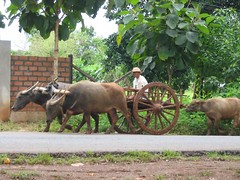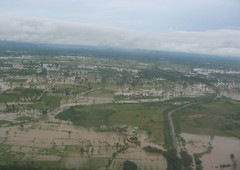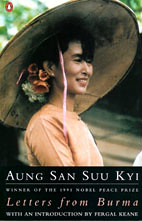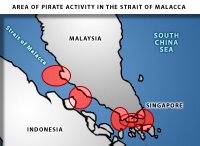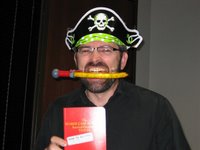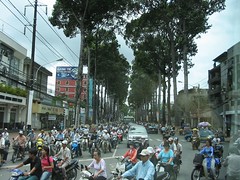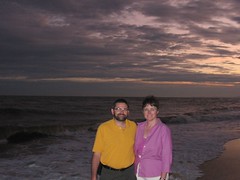Saturday while we were in Myanmar, a very important event happened a few thousand miles away in Missouri.
Our nephew Andy married his rhyme, Brandy, in what we suspect was Sedalia’s social event of the season. Welcome to the family Brandy!
Yours in congratulations,
Kelly and Mary
Saturday, October 14, 2006
#55 The visible Myanmar
We didn’t see first-hand evidence of repression in Myanmar. We'd read enough to know that traveling to tourist sites we would be unlikely to see anything other than people going about their everyday tasks. Uniformed police or military were no more visible in Myanmar than elsewhere, although undercover officers are said to be “everywhere” and the country ranks 10th in the number of active military. Visitors are not allowed to enter areas of the county with a history of civil unrest. One of the commercial guidebooks showed the roadway checkpoints which serve to define the limits of travel although no such designation is evident on the official government tourist map.
One author compared the situation of the average Myanmar resident to someone who has cancer. They know there is a serious problem but they must continue to go about the tasks of daily life.
Yours in even greater appreciation of our freedoms,
Kelly
One author compared the situation of the average Myanmar resident to someone who has cancer. They know there is a serious problem but they must continue to go about the tasks of daily life.
Yours in even greater appreciation of our freedoms,
Kelly
Friday, October 13, 2006
#54 Auspiciousness to you
Mingalar bar!
That’s how we say hello in Myanmar. Literally, it means “auspiciousness to you.” In each port, we learn how to say hello and thank you. Then we continue to use our new language skills until we replace it with another new language.
Myanmar is a poor country. That hits us hard as we step off this gated community we call a ship.
But Myanmar is rich in pagodas. Known as the Golden Land, Myanmar has countless religious monuments/pagodas/shrines/temples/stupas, due to a series of devout Myanmar kings and their citizens.
We spend our time in Yangon, Mandalay, and Maymyo with a surprise trip to Bagan. Yangon is our port city, flat, hot and humid on the banks of the Irrawaddy River. We fly to Mandalay, the former capital - flat, hot and humid on the banks of the Irrawaddy River upstream. From there, we drive 2 hours to Maymyo, the old British hill station, elevation 4000 feet, mountainous cool and comfortable with deep green forests, and surrounding fields of strawberries and chrysanthemums. We find it easy to like Maymyo.
Our surprise came when high water blocked our return to the Mandalay airport.
So we revert to the old reliable Irrawaddy River, now in flood stage, and a sleek passenger boat to whisk us 6 hours downriver to Bagan, where we catch the first flight out the next morning and arrive back at the MV Explorer just an hour before on-ship time. (For more on Myanmar experiences, don't forget to check out Erika's blog.)
Yours in not missing the boat,
Mary
That’s how we say hello in Myanmar. Literally, it means “auspiciousness to you.” In each port, we learn how to say hello and thank you. Then we continue to use our new language skills until we replace it with another new language.
Myanmar is a poor country. That hits us hard as we step off this gated community we call a ship.
But Myanmar is rich in pagodas. Known as the Golden Land, Myanmar has countless religious monuments/pagodas/shrines/temples/stupas, due to a series of devout Myanmar kings and their citizens.
We spend our time in Yangon, Mandalay, and Maymyo with a surprise trip to Bagan. Yangon is our port city, flat, hot and humid on the banks of the Irrawaddy River. We fly to Mandalay, the former capital - flat, hot and humid on the banks of the Irrawaddy River upstream. From there, we drive 2 hours to Maymyo, the old British hill station, elevation 4000 feet, mountainous cool and comfortable with deep green forests, and surrounding fields of strawberries and chrysanthemums. We find it easy to like Maymyo.
Our surprise came when high water blocked our return to the Mandalay airport.
So we revert to the old reliable Irrawaddy River, now in flood stage, and a sleek passenger boat to whisk us 6 hours downriver to Bagan, where we catch the first flight out the next morning and arrive back at the MV Explorer just an hour before on-ship time. (For more on Myanmar experiences, don't forget to check out Erika's blog.)
Yours in not missing the boat,
Mary
Friday, October 06, 2006
#53 Myanmar, or is it Burma?
Tonight (Saturday) we dock in Yangon, Myanmar.
It used to be called Rangoon, Burma and still is by many. In preparation for our visit, we’ve been reading about Burma – Burmese Diary by George Orwell, Finding George Orwell in Burma by Emma Larkin, and Letters from Burma by Aung San Suu Kyi.
Before this trip when asked about our ports of call, we would recite: Mexico, Hawaii, Japan, China, Hong Kong, Vietnam, Myanmar… and get a quizzical look. Yea, before this trip, the country formerly known as Burma was not on my radar either.
Early in our voyage, I met a gem of a couple, Tom and Dianne Klein, educators from Ohio, who recommended Finding George Orwell in Burma by Emma Larkin as an excellent example of creative non-fiction. Larkin, writing under a pen name to avoid retaliation from the current brutal military regime, travels to sites where Orwell lived in Burma and learns the locals view Orwell as a prophet, given the distinct similarities between the current repressive Myanmar government and that described in Orwell’s 1984.
During a brief uprising in support of democratic rule in 1988, the Myanmar government ordered thousands shot in the streets and thousands more thrown in prison for conduct detrimental to the state. Reacting to the resulting international outrage, the government agreed to democratic elections where the opposition movement garnered over 80% of the vote. The government ignored the election results and put Aung San Suu Kyi, the charismatic opposition leader, under arrest. In 1991, she won the Nobel Peace Prize. U2 wrote “Walk On” about her struggles and dedicated the song to her. That song is banned in Myanmar where she remains under arrest today. This September, the United Nations Security Council voted to formally add Burma to its agenda.
Today, citizens of Myanmar are living the 1984 big brother nightmare. For example, visitors must make up their mind early if they intend to stay the night because their presence has to be reported to the local Law and Order Restoration Council by 9 pm. Failure to “report the guest list” could result in a fine or a prison sentence for both the guest and the host. Nobody may go away for the night from his own home without informing the local LORC as well as the LORC of the place where he will be staying. The authorities have the right to check at any time during the night to see if there are any unreported guests or if any of the family members are missing.
We’ve learned that a few students will not be getting off the ship at this port so as not to financially support the military. And faculty have told us Desmond Tutu will be sailing on the fall 2007 voyage of Semester at Sea under the condition the ship does not dock in Myanmar. Our plans are to spend the next few days in the port city of Yangon and in Mandalay, the cultural heartland of Myanmar.
Yours in approaching Myanmar,
Kelly
It used to be called Rangoon, Burma and still is by many. In preparation for our visit, we’ve been reading about Burma – Burmese Diary by George Orwell, Finding George Orwell in Burma by Emma Larkin, and Letters from Burma by Aung San Suu Kyi.
Before this trip when asked about our ports of call, we would recite: Mexico, Hawaii, Japan, China, Hong Kong, Vietnam, Myanmar… and get a quizzical look. Yea, before this trip, the country formerly known as Burma was not on my radar either.
Early in our voyage, I met a gem of a couple, Tom and Dianne Klein, educators from Ohio, who recommended Finding George Orwell in Burma by Emma Larkin as an excellent example of creative non-fiction. Larkin, writing under a pen name to avoid retaliation from the current brutal military regime, travels to sites where Orwell lived in Burma and learns the locals view Orwell as a prophet, given the distinct similarities between the current repressive Myanmar government and that described in Orwell’s 1984.
During a brief uprising in support of democratic rule in 1988, the Myanmar government ordered thousands shot in the streets and thousands more thrown in prison for conduct detrimental to the state. Reacting to the resulting international outrage, the government agreed to democratic elections where the opposition movement garnered over 80% of the vote. The government ignored the election results and put Aung San Suu Kyi, the charismatic opposition leader, under arrest. In 1991, she won the Nobel Peace Prize. U2 wrote “Walk On” about her struggles and dedicated the song to her. That song is banned in Myanmar where she remains under arrest today. This September, the United Nations Security Council voted to formally add Burma to its agenda.
Today, citizens of Myanmar are living the 1984 big brother nightmare. For example, visitors must make up their mind early if they intend to stay the night because their presence has to be reported to the local Law and Order Restoration Council by 9 pm. Failure to “report the guest list” could result in a fine or a prison sentence for both the guest and the host. Nobody may go away for the night from his own home without informing the local LORC as well as the LORC of the place where he will be staying. The authorities have the right to check at any time during the night to see if there are any unreported guests or if any of the family members are missing.
We’ve learned that a few students will not be getting off the ship at this port so as not to financially support the military. And faculty have told us Desmond Tutu will be sailing on the fall 2007 voyage of Semester at Sea under the condition the ship does not dock in Myanmar. Our plans are to spend the next few days in the port city of Yangon and in Mandalay, the cultural heartland of Myanmar.
Yours in approaching Myanmar,
Kelly
Thursday, October 05, 2006
#52 From Indiana to the Indian Ocean
When I was a kid, Mom told me if I dug a hole deep enough, I’d pop up in China. And one of those cool Google Maps applications tells me if I start digging in Indianapolis, I’ll pop up in the Indian Ocean. Today, we emerged unscathed from the pirate-infested waters of the Strait of Malacca and entered the Indian Ocean. As that transcontinental crow flies, we’re 9090 miles from Indiana. Along the way, we came close (within 1 degree) to crossing the equator.
Yours in popping up on the other side of the world,
Kelly
Yours in popping up on the other side of the world,
Kelly
Wednesday, October 04, 2006
#51 Pirates in the Strait of Malacca?
It’s a good thing Kelly had such good pirate training at IDEM before we left Indiana! This afternoon, while we’re making our way from Singapore to Myanmar through the Strait of Malacca, we’re reportedly in the greatest danger from pirates.
So much so, passengers have been recruited to stand watch for pirates. And Kelly, feeling especially confident from his in-depth training, eagerly signed up for the 1600 to 1700 shift.
Had he spotted any craft approaching within 100 meters, he was instructed to yell into the two-way radio “Security, Security, Pirate Approach, Pirate Approach.” We learned earlier on our bridge tour that one crew member is always scouting visually in addition to the radar systems. Kelly reports that in the 1600-to-1700 time slot, the Black Pearl failed to emerge from the mist.
Yours in wondering if Captain Jack Sparrow is in the neighborhood,
Mary
So much so, passengers have been recruited to stand watch for pirates. And Kelly, feeling especially confident from his in-depth training, eagerly signed up for the 1600 to 1700 shift.
Had he spotted any craft approaching within 100 meters, he was instructed to yell into the two-way radio “Security, Security, Pirate Approach, Pirate Approach.” We learned earlier on our bridge tour that one crew member is always scouting visually in addition to the radar systems. Kelly reports that in the 1600-to-1700 time slot, the Black Pearl failed to emerge from the mist.
Yours in wondering if Captain Jack Sparrow is in the neighborhood,
Mary
Monday, October 02, 2006
#50 Yes, we have no McDonalds.
In Vietnam, Ho Chi Minh City is our first McDonalds-less port. And that’s not the only exotica in Vietnam. Not many visitors arrive here by ship. Our captain spent four hours navigating upstream from the mouth of the Saigon River passing a bewildering variety of boats along the winding river route through seldom seen mangrove forests to reach this crowded city of over 5 million residents formerly known as Saigon.
According to our guide book, “To cross a busy street in Vietnam all one has to do is step out into the coming traffic. The motor scooters, cars, and buses will maneuver around you until you have reached the other side. Do not run as they will not be able to gauge your movement; just keep a steady pace.”
This alien behavior that would ensure injury in most places is absolutely required here. Volunteer tourist assistance police have the job of encouraging visitors off the curb and into the traffic vortex. It’s a little like Frogger. We saw first timers jump up and down with euphoria upon reaching the safety of the opposite curb unscathed. With some experience, it becomes second nature to take a quick glance toward oncoming traffic, time your departure to take advantage of a small gap, and then walk without looking toward the traffic. It’s only when you look that you question your sanity and are tempted to stop or run. That would be bad since the drivers have subconsciously already adjusted their speed and path. This works in part because drivers make absolutely no attempt to stay in any marked lanes, so they weave about as needed to avoid pedestrians and other motorists. In practice, this seems to work beautifully since pedestrians never have to wait for traffic to clear and drivers never have to stop to wait for pedestrians. However, the 1,000 traffic fatalities per month lead us to question the system.
After a day in Saigon, we travel to the east coast for 3 days of R&R and to experience the “Hawaii of Vietnam.” In 2003, Time described Phan Thiet as “unspoiled Vietnam”, and three years later we don’t see much evidence of spoiling. The 16 students we lead on the trip enjoyed the sand dunes, the cyclo tour of the city and the sampan ride among the fishing boats in the picturesque harbor.
Back in Saigon, we meet Erika for drinks on the rooftop garden at the Rex Hotel, a haven for foreign journalists during what was known in Vietnam as “The American War.” Mary’s uncle lived in Saigon in the early 1970s and we are successful in locating his hangouts. (We have lots of photos to share with you, Lillard.)
Before my visit, I thought “war” whenever I heard “Vietnam.” I now have other images. There’s no attempt in Vietnam to hide the war, but the local interpretation is through the communist lens.
Today, Monday, we are back at sea for a few days, headed for a quick refueling stop in Singapore before continuing to Myanmar.
Yours in moving forward beyond “Vietnam,”
Kelly
Our location: 7 degrees 53 minutes North, 107 degrees 9 minutes East.
According to our guide book, “To cross a busy street in Vietnam all one has to do is step out into the coming traffic. The motor scooters, cars, and buses will maneuver around you until you have reached the other side. Do not run as they will not be able to gauge your movement; just keep a steady pace.”
This alien behavior that would ensure injury in most places is absolutely required here. Volunteer tourist assistance police have the job of encouraging visitors off the curb and into the traffic vortex. It’s a little like Frogger. We saw first timers jump up and down with euphoria upon reaching the safety of the opposite curb unscathed. With some experience, it becomes second nature to take a quick glance toward oncoming traffic, time your departure to take advantage of a small gap, and then walk without looking toward the traffic. It’s only when you look that you question your sanity and are tempted to stop or run. That would be bad since the drivers have subconsciously already adjusted their speed and path. This works in part because drivers make absolutely no attempt to stay in any marked lanes, so they weave about as needed to avoid pedestrians and other motorists. In practice, this seems to work beautifully since pedestrians never have to wait for traffic to clear and drivers never have to stop to wait for pedestrians. However, the 1,000 traffic fatalities per month lead us to question the system.
After a day in Saigon, we travel to the east coast for 3 days of R&R and to experience the “Hawaii of Vietnam.” In 2003, Time described Phan Thiet as “unspoiled Vietnam”, and three years later we don’t see much evidence of spoiling. The 16 students we lead on the trip enjoyed the sand dunes, the cyclo tour of the city and the sampan ride among the fishing boats in the picturesque harbor.
Back in Saigon, we meet Erika for drinks on the rooftop garden at the Rex Hotel, a haven for foreign journalists during what was known in Vietnam as “The American War.” Mary’s uncle lived in Saigon in the early 1970s and we are successful in locating his hangouts. (We have lots of photos to share with you, Lillard.)
Before my visit, I thought “war” whenever I heard “Vietnam.” I now have other images. There’s no attempt in Vietnam to hide the war, but the local interpretation is through the communist lens.
Today, Monday, we are back at sea for a few days, headed for a quick refueling stop in Singapore before continuing to Myanmar.
Yours in moving forward beyond “Vietnam,”
Kelly
Our location: 7 degrees 53 minutes North, 107 degrees 9 minutes East.
Subscribe to:
Posts (Atom)
